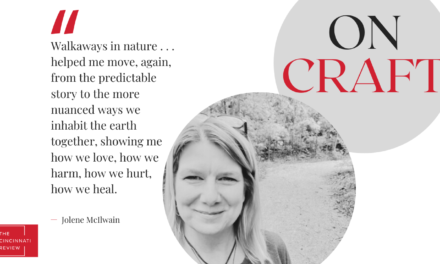Assistant Editor Lisa Low: When I get stuck coming up with a title for a poem, I think of biblical Adam, who was tasked with naming the animals but who didn’t (inconceivably to me) show any signs of indecision or lack of ideas. Titling is sometimes the easiest, sometimes the hardest part of crafting a poem—a process that seems shrouded in both mystery and luck.
A title is arguably the most public part of a poem. Not only is it the first component the audience encounters—with the burden of making the first impression—but it’s what a poem shares with other genres (stories, TV shows, movies, songs, news articles, five-paragraph essays, etc).
So how do poets craft a good title? How does it interact with the rest of the poem? What are the common traits for good titles? In my effort to demystify titles, I asked other CR staff and former contributors to share their wisdom.
NaBeela Washington compares poem titles to movie previews, a metaphor that recalls the failure of a preview that gives away all the good scenes. “If the title gives too much detail,” she says, “it could spoil the little surprises that often occur in poetry. But by leaving the door open, through smaller hints you let the reader have some control of how they interpret the poem.”
Associate Editor Madeleine Wattenberg uses the image of an anchor to think about how titles can provide context, “rooting a poem that’s unwieldy, to assist the reader.” But it really depends on the poem itself—Wattenberg mentions that titles can also complicate a “one-note” poem. “I think a general rule is to pick a title that opens up the poem’s possibilities rather than closes them down, but sometimes my poems need closing down,” she says.
Samyak Shertok has used titles to contextualize content as well as to identify the form of the poem—“I blame Bishop and Agha Shahid Ali for this”—such as with his Robert and Adele Schiff Award–winning “No Man’s Land Ghazal.” For him, the most accomplished titles “exist in some kind of conflict with the poem. A poem titled ‘Love Poem,’ for instance, that not only subverts the expectations of the genre but also revises and extends our understanding of what a love poem is or should do is doubly rewarding.”
For Danni Quintos, effective titles are “watertight.” She’ll sometimes try a few different ones out, like lids to a jar, and admires when she can see the evidence of other poets also revising titles, “their parenthetical former names listed in the acknowledgements.”
All the poets I talked to similarly described the transformative aspect of titles. Quintos says that a good title “grows in weight once you finish the poem,” Washington thinks of titles as seeds that “grow and reveal their true nature upon reading a piece,” and Daniella Toosie-Watson refers to titles “that generate an additional layer.”
Toosie-Watson says, “My main strategy for titling my poems is to ask myself about the poem’s goals and emotional intentions. I ask, ‘What is going to direct the reader towards the emotional core?’”
Here are some of their anecdotes about the crafting of specific titles:
Quintos on “Milkfish,” published in our miCRo series: It points to a specific place, a flavor, a folktale. And the connotations of the compound word’s pieces fit so well with tying motherhood to the sea. How can you talk about milk without talking about motherhood? Plus, milkfish is one of my favorite Filipino foods to eat (stuffed and baked, or in sinigang, please!). For me, it is comfort food, tied to a memory of lolas shuffling around a kitchen, squashing epic roaches under their beaded slippers without blinking. And to inhibit that liminal space of being an Asian American (a mixed-race Asian American, no less) there is a persistence of not being enough or performing my identity correctly. Food makes me feel like I am allowed to claim my Asian-ness. Milkfish is a door into writing about being Filipinx-American.
Shertok on “No Rhododendron,” published in Colorado Review: The poem is written from the perspective of the innocent villagers who’re caught in the crossfire of the government forces and the rebels, but the title comes out of the collective mouth of Those-Who-Walk-at-Night: “They said No pointing at the stars. / They said No rhododendron.” Even as I attempt to foreground the common people’s plight, one of the warring groups, in a way, ends up claiming the poem with their voice just as they permanently scarred thousands of lives. The title also has a resonance for the whole manuscript, for rhododendron is the national flower of Nepal and several poems in it are haunted by displacement, exile, and failed nostos.
(CW: Paragraph includes discussion of homophobia)
Toosie-Watson on “Dad Says Being Gay is Like Kissing Your Mother, then Prays,” published in Virginia Quarterly Review: In order to title this poem, rooted in the self’s memory, I thought about associative memory, what memory I could use for the title that might pair well with the one written about to bring the poem to a new place. I thought about how my Dad (yes, the poem is biographical) thought that killing the ants [a practice mentioned in the poem] was cruel, which made me think of his own cruelty, his homophobia. I had always known my dad as a kind man who was good to me. Until one day when I was eight, driving in the car with him and my sister, we got into an argument with him about queerness, and he said that “being gay is like kissing your mother.” I was so jarred by that moment, that this man who I had only known to be kind simultaneously held within him this kind of cruelty. And so, this memory, before I had come up with the title, informed how I wrote the rest of the poem. I titled the poem after I finished writing it. The turn in the last line resonates off of the title: the voice is reflected back, the resonance of the last line and of the title becoming a part of one another.
Washington on “Burger King was once home,” published in our miCRo series: For me, “Burger King” was crucial to the title because of its universal and relatable appeal. If you haven’t eaten at Burger King, you’ve probably heard of it or are familiar with the concept of fast-food chains. I wanted to immediately transport readers to a specific place, a place that isn’t very special to others but was an important element of my childhood. The latter three words ‘was once home’ were added to introduce a sentiment to Burger King that isn’t normally there. I wanted readers’ construct of this place to be broken down beyond your everyday fast-food restaurant, to something rawer and more intimate. I wanted them to understand that the people that slave away at these “essential jobs” are also mothers and fathers, students, and people you might pass on the street without another thought. They are not the place in which they work to survive; they are capable of humanity beyond the grease that stains their uniforms; beyond flipping burgers and ringing up customers.
Titling ideas/activities to try, inspired by their discussions:
- When writing a one- or two-word title, think about the balance and/or tension between closure and open-endedness. Other recent one- and two-word titles from our miCRo series: Detonations, Magnets, Posies, Dodge, Cruising, Chimera, and It Is.
- Write a title that mentions a place and subverts its typical associations, like Washington’s.
- A longer title usually means more specificity. Write a few different versions of a long title that plays with more and less mystery. How are specificity and mystery a binary, and when do they coexist?
- Write several different titles for the same poem and reflect on how they set up the rest of the poem differently.
- Compare your title to the last line of your poem. What are the ways that they currently resonate? Try amping up more of the resonance without explicit repetition.












This article really connects with me and ideas I’ve been obsessing over recently. Well put together and appreciated.